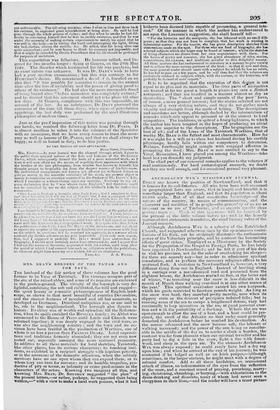MRS. BRAY'S BORDERS OF THE TAMAR AND THE TAVY.
THE husband of the fair author of these volumes has the good fortune to be Vicar of Tavistock. The vicarage occupies part of the site of the ruined abbey, and some of its remains are embraced in the garden-ground. The vicinity of the borough is very de- lightful, combining the soft and cultivated, the wild and rugged— the quiet beauty or romantic picturesqueness of English land- scape, as shown in that most beautiful of counties Devonshire, and the sterner features of moorland and all but mountain, as developed on Dartmoor. Druidical antiquities are, or are said to be, rife in the neighbourhood. The borough also figures in history. Its abbey was of wealth and splendour till the Reforma- tion, when its spoils enriched the RUSSELL family ; its Abbot was summoned to the House of Peers until Lords and Church were reformed together; it was deeply engaged in the civil wars, as was alsa the neighbouring country ; and the town and its en- virons have been fruitful in the production of Worthies, one of whom is no less a person than FRANCIS DRAKE. Local supersti- tions and traditions formerly abounded ; they are not even now rooted out, especially amongst the more scattered peasantry. In addition to all these materials for local sketches, Tavistock, like other places, has its curious characters; its touching inci- dents, as exhibted in a resigned struggle with hopeless poverty, or in the severance of the domestic affections, when the solitary survivors have no one upon whom they can expend them, or to whom they can turn for succour; and its humble tragedies, pro- ductive of pity or terror, as infirmity or crime predominate in the characters of the actors. Knowing (we imagine) all this, and knowing Mrs. BRAY, Dr. SOUTHEY suggested " the plan" of the present letters,—or rather, perhaps, he suggested their being written,—" with a view to make a local work possess, what it had hitherto been deemed little capable of possessing, a general inte- rest." Of the manner in which the author has endeavoured to act upon the Laureate's suggestion, she shall herself tell- " For the historian and the antiquary, she has laboured with no small dire- genee ; so that they may not have to complain that her work is wanting is substantial matter. For the tourist, she has given descriptive sketches from- observations made on the spot. For those who are fond o biography, she hae• selected subjects which she hopes may be found of interest ; whilst the sketches of living characters are drawn from her own acquaintance with them. For the luvera of poetry and romance, she has given abundance of tales, stories, superstitions, old customs, and traditions peculiar to this delightful county. All these matters she has endeavoured to introduce in a manner to give variety and to relieve the more serious portions of the book : so that if, now and then, the mere general reader should meet with a subject for which he has no relish, he has but to pass on a few pages, and he will then find that the volumes are exclusively confined to subjects which, with the curious, or the historian, will probably be deemed of most impart."
It is to be regretted that the execution of this design is not equal to its plan and its materials. The drier parts of antiquities are treated at far too great a length to please any save a British antiquary; and they are handled in a manner almost as dry as themselves. The " short and simple annals of the poor- have, of course, a more general interest ; but the stories selected are not always of a very striking nature, and they do not gather much vivacity and strength from the mode of telling. The descriptions and anecdotes are better, although dashed by the intermixture of remarks which only appeal to personal or at the utmost to local sympathies. The traditions, in spite of a heavylightness, to %%Melt the author has been tempted in the hopes of producing an aerial effect, are superior to the descriptions. The biographies are the best of all ; and of the Lives of the Tavistock Worthies, that of worthy Mr. BRAY is the fullest and most characteristic. How far it was right for a wife so to class her husband during his earthly pilgrimage, hardly falls within our competency to determine. Perhaps, forethought might mingle with conjugal affection in prompting the deed : Mrs. BRAY is now entitled to say to the Vicar, Remember, I have placed you among the Worthies—take heed lest you discredit my judgment. The chief part of our censorial remarks applies to the volumes if read continuously. For hard archaeological research, we doubt not they arc well enough, and for occasional perusal very pleasant..


























 Previous page
Previous page